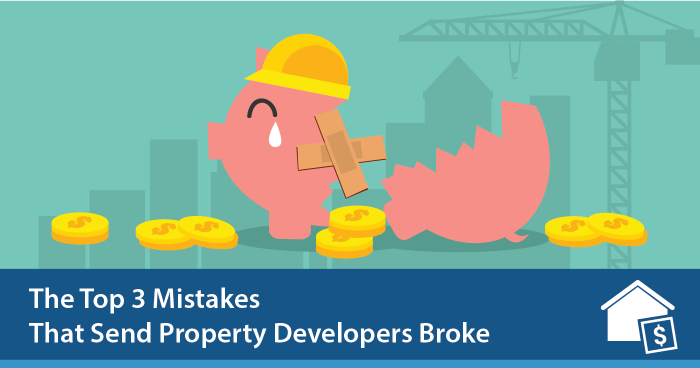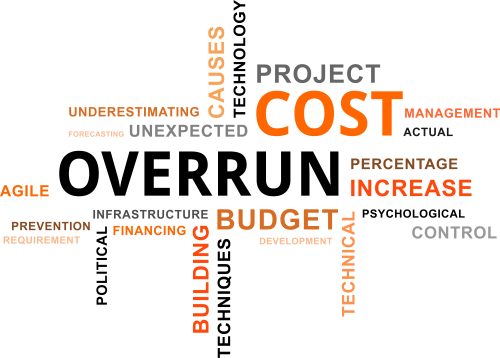The Top 3 Mistakes That Send Property Developers Broke

If you’re interested in the fastest way to create massive wealth using property, then read every word of this blog post.
You probably know that when it comes to cold hard cash, no strategy is a match to the obscene amounts of money that can be made in just ONE properly run development project.
But hold your horses, because there’s one truth of life you must take into account. The higher the reward – the higher the risk. And in property development, just one failed project could be your one-way ticket to losing all of your life savings…and even bankruptcy.
This is why I invited Blake Lanham, from Lanham Constructions Qld Pty Ltd, for a chat. I wanted to find out what are the most common mistakes that make property developers go broke and how can smart property investors avoid them.
What he revealed was far from complex property market flotation theories or technical construction stuff. He talked about some simple practices that, when followed, can not only save you from losing your hard earned money but lead you to a world of wealth with property development.
After 10 years in the construction game as a builder and design/construction specialist, Blake knows what it takes to complete a successful building project. And he also knows how easy it is for developers to lose money.
I'm pulling back the curtain, revealing my best kept Deal Finding Secrets!
- My Secret Search Strategies: Unlock hidden cracker deals no one else knows about
- Stop wasting hours on research: Simple setup automatically hunts down hot deals for you!
- How to use Australia’s top research tool anytime to turning boring research into an exciting treasure hunt
- Bonus: Free Research Tool Credits Included!
🎯 Don’t miss this!
According to Blake:
There’s a basic belief among newbies that property development is easy and quick, that is not the case.”
Blake has seen many people who complete short property development courses and immediately run out with their first joint venture partner to start buying up properties.
Often, he said, these people—who are initially very excited about property investing—end up walking away from a deal due to a lack of preparation and communication.
Drawing from his vast design and construction experience, Blake shared the top three mistakes that send property developers broke.
1. Not getting (good) advice

Whether you are planning a renovation or a design/build project, bad advice—or no advice—can end up costing you a bundle.
According to Blake, you need to assemble a trusted team of advisors that will provide you with good advice and make your development or renovation experience easier.
Before you purchase a site for development, it is a good idea to consult with a builder to help you figure out how you will construct and orientate the buildings. Your builder also can help you develop a design concept that a town planner can review.
Getting good advice up front will provide you with more accurate cost information that you can use to complete your feasibility analysis. And, it can prevent you from purchasing a property that you are unable to develop in a profitable way.
Renovators also should make sure that they are getting sound advice, especially during the design phase of the project.
Although Blake believes that a do-it-yourself renovation is a great option, it is important to get help with the complex aspects of the project, such as structural, electrical and plumbing work.
I’ve done more than 100 renovations, and I recommend that developers have a specialist walkthrough to help with the design,” Blake said.
That’s because Blake’s experience has proven that cutting costs by failing to get expert design advice can end up costing more money. In Blake’s experience, it is much more expensive to fix a mistake than to get it right on paper in the first place.
Blake recalls a situation where a renovator spent $10,000 and caused all kinds of structural problems by moving a wall half a meter to make a room bigger. What the renovator didn’t realize was that it would have cost them only $200 to achieve the same result by removing or moving an adjacent wall.
A qualified designer would have been able to offer alternative approaches in that situation, he said. In fact, Blake usually accompanies his firm’s architectural team on design projects to provide guidance from a builder’s perspective on things such as roof lines, asbestos mitigation and structural elements.
The dangers of cost-cutting don’t just apply to design services; by failing to hire the right experts, Blake said that investors can run into similar problems in many other areas of a development project, including civil works, landscaping, traffic engineering, town planning and many other things.
Even on a small build, good up-front advice can save you $20,000-$30,000. On a major build, it can save you more than $100,000.”
In addition to seeking help from qualified construction and development professionals, an experienced joint venture partner or a mentor can also be great sources of advice, especially for first-time developers.
Blake’s take away: “If people haven’t been through the process before, they need to sit down with someone who will scare them and be really honest about all those bits and pieces so they are aware of them,”
2. Choosing the wrong builder

Although there are many things to consider when selecting a builder, choosing the right one for your project is key. Blake says that “a broke builder can spell disaster for your budget and your project.”
People tend to trust their gut when choosing a builder, and I totally respect that, but they also should find out about the builder’s experience and qualifications.”
There are several important questions that every developer should ask prospective builders, including:
- What type of construction they specialize in;
- What is their typical build size; and
- What is the typical dollar value of their projects.
It is important to also consider a builder’s project management experience to make sure that they have the business and economic expertise required to handle the project.
According to Blake, “looking at the type and value of the projects that a builder is doing is usually a good indicator of what they will be comfortable handling,”
Although you can never know a builder’s exact financial position, you want to do everything you can to make sure that builder doesn’t go broke – and for Blake checking their license is a good start.
If you are looking to do a $1 million project and a builder’s turnover is $1 million, that is probably not the right builder for you,” Blake said.
If possible, you should also ask for references or talk to other developers who have used that builder. It is also a good idea to go see some of the builder’s properties for yourself to get a feel for their area of specialisation.
When it comes to property development, time is money. Depending how large the development project is and current interest rates the project could be costing you between $100 and $200 a day. So, for the sake of your project’s profitability, it’s crucial that your builder finishes the job on time.
One way to evaluate the builder’s delivery capabilities is to ask how many times have they paid penalty damages. Those are the late fees they need to pay whenever a project is delivered late, and it’ ill give you a good idea of their track record on similar projects.
“In nine years, I have not had a single liquidated damage,” Blake said. “However, we did have some flooding this year that caused a project to run late.”
Property development is ultimately a people business, so you should also pay attention to how the builder communicates with you. Blake said you should make sure they are responsive and don’t leave you in the dark.
3. Underestimating costs

Whether your project is a renovation or a design/build, it is critical that you accurately estimate your costs and complete a correct feasibility analysis.
At best, an incorrect feasibility analysis can cause you to lose money. At worst, it can prevent you from obtaining adequate financing and can sabotage your entire project.
Many developers fall into the trap of only including the costs of building the actual dwelling in their feasibility study. They often forget to include things like civil works, landscaping and town planning—which can put a project over budget before the developer even realises it.
Ninety percent of our client tenders are 15-20 percent higher than what they can afford,” said Blake
Blake encourages his clients to have a 20 percent rate of profit because they are bound to miss things in their feasibility study.
“The bank wants to see 17-18 percent profit, minimum, or you won’t get funding,Twenty percent is a safe bet.” Blake said.
He has seen way too many sad stories of people getting attached to their project only to have it fail due to lack of communication or lack of planning.
“You need to do your due diligence by mapping your costs to get 20 percent profit,” he said.
People need to disengage emotionally and make sure that the deal is going to be there for them and their family in time.”
When Blake was working on his first development, he saw his 27 percent profit drop to 12 percent after reviewing his feasibility study with an expert. That’s because he forgot to include critical costs.
Talking to a builder early in the process can help developers get a more accurate estimate and prevent costly mistakes, omissions and problems down the road.
“The beauty of a design/construction company is that we can design to marry up with a budget,” Blake said. “I have an ulterior motive of trying to get the build. If I see that it’s not going to stack and I won’t get that built, I am going to tell you.”
Whether it is your first project or your 15th, Blake said that the best way to avoid mistakes is preparation. “Preparation is everything,” he said. “You have to have all your ducks in a row and start the right project the right way.”
If you need more guidance on how to complete a successful development, our DIY Property Development Kit inside the Ultimate Property Hub Membership Site can help.
Looking for proven ways to create profits in the current market?
You'll find over 200 step-by-step case project studies, our renown Master Classes and Property Crash Courses… and heaps more!
Try the Ultimate Property Hub now –– it's free!


0 thoughts on "The Top 3 Mistakes That Send Property Developers Broke"